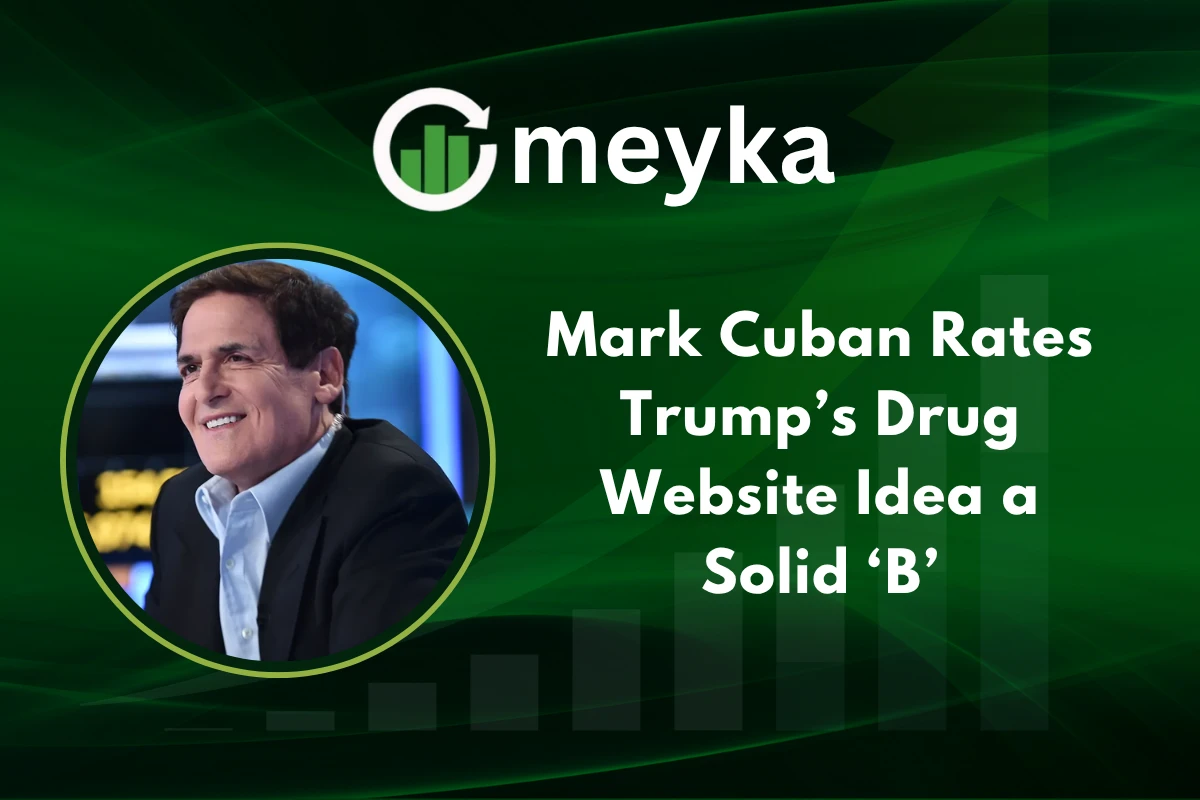Mark Cuban Rates Trump’s Drug Website Idea a Solid ‘B’
Mark Cuban, the billionaire entrepreneur behind Cost Plus Drugs, has weighed in on the White House’s new TrumpRx plan. He called the idea a solid “B”, praising its aim to cut prices but warning it may not topple entrenched middlemen.
His view matters because Cuban runs a rival low-cost pharmacy model and has long pushed for drug price transparency.
Mark Cuban Reacts to TrumpRx
What did Mark Cuban say, and why does it matter?
Cuban publicly gave the plan a B grade, saying it has promise but may not disrupt pharmacy benefit managers, or PBMs, the firms many critics blame for opaque pricing.
He noted that PBM stock prices barely moved after the announcement, which he takes as a sign the market expects limited near-term disruption.
Why does this matter? Because Cuban runs Cost Plus Drugs, his view is both partisan and practical. He knows the mechanics of cheaper distribution and sees where government plans could fall short. His grade signals cautious optimism rather than full-throated endorsement.
Background on TrumpRx and Its Purpose
What is TrumpRx?
TrumpRx is a proposed government-run, direct-to-consumer platform that aims to let Americans buy prescription drugs directly from manufacturers or approved sellers, skipping some intermediaries.
The White House said Pfizer will participate, and the platform is slated to launch in 2026. Officials say the move will lower prices for many patients.
Why is the government doing this? The administration wants to show quick wins on drug affordability. It pairs pricing commitments with incentives such as tariff relief and pledges for onshore investment. That trade-off persuades some manufacturers to agree to discounted pricing for public programs like Medicaid.
Mark Cuban and Cost Plus: A Natural Comparison
How does Cost Plus stack up against TrumpRx?
Cuban’s Cost Plus Drugs runs a transparent pricing model: manufacturer cost plus a small markup and fixed fees. He argued that if Cost Plus were included on TrumpRx, the platform would deliver even better savings. Cuban sees inclusion as a low-cost, practical way to strengthen the program.
What did Cuban really mean by a “B”? He’s saying the plan is promising but incomplete. For Cuban, full impact requires real changes to PBM incentives, broader marketplace access for low-cost sellers, and durable rules that prevent cost-shifting. His grade is a call for more teeth, not a dismissal.
The Pharma Industry and Pfizer’s Role
Why is Pfizer on board?
Pfizer agreed to participate in TrumpRx and to offer some drugs at sharply reduced prices for Medicaid in return for policy concessions, including tariff relief and manufacturing commitments. The company framed it as a way to invest more in U.S. production while helping lower-cost patients.
Will other drugmakers follow? Possibly. The combination of public pressure, carrots like market access and sticks like tariff threats could bring more manufacturers to the table. But industry watchers caution that deals limited to Medicaid or specific programs do not automatically translate into broad price cuts for all Americans.
Political Implications and Public Reception
How is the public reacting?
Reactions split. Supporters praise the move as a bold step to make drugs affordable. Skeptics, including some policy experts and advocacy groups, say the deal’s narrow scope and reliance on voluntary corporate promises limit its impact.
Cuban’s mixed but hopeful take mirrors the broader public mood: welcome the effort, but watch for implementation details.
Why does this matter politically? Drug prices are a major voter issue. A visible, marketable program like TrumpRx helps the administration show action. But a program that fails to deliver wide savings could quickly become a political liability. Cuban’s public rating gives the plan credibility while also pressing for deeper change.
Expert Views on Affordability and Transparency
What are experts saying?
Analysts note that direct-to-consumer platforms can lower some out-of-pocket costs. However, experts warn that without tackling PBM practices and insurer dynamics, savings may be partial. Transparency advocates want clear rules on who can sell on the platform and how rebates and margins will be handled.
Could TrumpRx spark systemic change? It could, if the platform forces different price-setting behavior and other companies join under similar terms. But lasting change needs structural fixes that realign incentives across the supply chain. Cuban’s business and commentary underline that point: transparency helps, but it may not be enough alone.
Social Media and Public Dialogue
What did Mark Cuban post?
Cuban shared his reaction on X, highlighting the plan and its limits. He urged inclusion of transparent, low-cost providers like Cost Plus Drugs to maximize consumer benefit. His post spurred debate across social feeds, from supporters urging speedy rollout to critics demanding deeper reform.
What did others say online? Many on social media praised the idea for its potential to lower prices, but others questioned the reliance on voluntary industry cooperation and the absence of Medicare-wide measures. The online debate shows the public wants fast results and durable policy fixes.
The Possible Future of TrumpRx and Cuban’s Final Thoughts
What happens next?
Officials say TrumpRx aims to go live in 2026, with initial drug offerings for Medicaid and a public-facing site to follow. The plan’s long-term success will hinge on which companies join, how the platform handles third-party sellers, and whether Congress or regulators take complementary steps.
Where does Mark Cuban stand now? He stands cautiously optimistic. Giving the plan a B is a public nudge: the idea has real potential, but it needs broader access and systemic fixes. Cuban’s message is simple and pointed: include transparent sellers, loosen PBM power, and make price cuts meaningful for ordinary patients.
Conclusion
Mark Cuban graded TrumpRx a solid B because he sees the policy’s promise and its limits. The plan makes headlines and may deliver important savings for some Medicaid patients. Yet Cuban and other experts warn that real reform requires more than a website. To transform U.S. drug pricing, the country needs clearer pricing rules, more transparent supply chains, and competitive access for low-cost sellers.
For now, Cuban’s balanced thumbs-up is a useful early test: support, but keep watching, and push for deeper reforms that can actually reshape a system that has long kept Americans paying more for medicine.
FAQ’S
Mark Cuban sold Broadcast.com to Yahoo in 1999 for $5.7 billion in stock. The deal made him a billionaire almost overnight and remains one of the largest dot-com acquisitions.
Mark Cuban has shown interest in buying sports franchises and tech-driven healthcare companies. He is most famous for co-owning the Dallas Mavericks and investing in startups on Shark Tank.
The company was Broadcast.com, which he co-founded with Todd Wagner. Yahoo purchased it in 1999 for stock valued at $5.7 billion, far exceeding the billion-dollar mark.
Cuban entered the pharmaceutical sector by launching the Mark Cuban Cost Plus Drug Company, which sells generic medications at transparent prices, aiming to make prescriptions more affordable.
On Shark Tank, Mark Cuban once offered $30 million for Ten Thirty One Productions, a live entertainment company specializing in horror experiences. The deal made headlines as one of the largest offers in the show’s history.
Yes, Mark Cuban is a real billionaire, with a net worth estimated at over $5 billion. His wealth comes from tech ventures, sports ownership, TV deals, and healthcare investments.
Disclaimer
This content is made for learning only. It is not meant to give financial advice. Always check the facts yourself. Financial decisions need detailed research.






